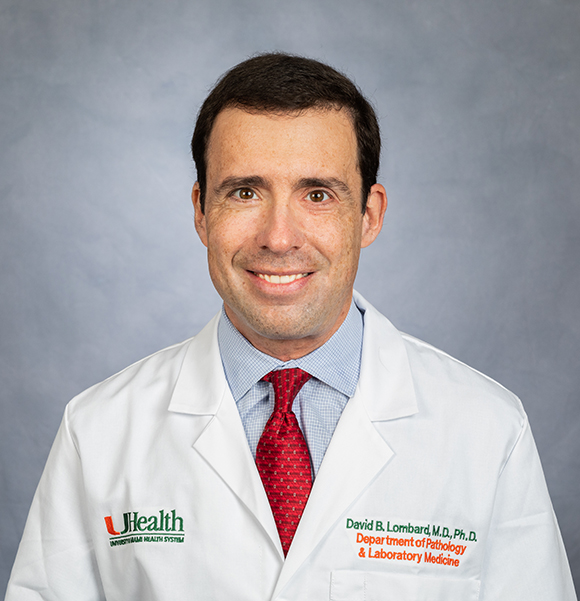October 14, 2022 – David B. Lombard, M.D., Ph.D., has been named co-leader of the Cancer Epigenetics Program at Sylvester Comprehensive Cancer Center, part of UHealth – University of Miami Health System.

“The Cancer Epigenetics Program is focused on studying epigenetic changes found to play critical roles in cancer, an area of research in which Dr. Lombard has made notable strides,” said Stephen D. Nimer, M.D., director of Sylvester, Oscar de la Renta Endowed Chair in Cancer Research, and executive dean for research at the University of Miami Miller School of Medicine. “He is an asset to Sylvester as a talented physician-scientist and a leader whose contribution will be felt for years to come.”
Dr. Lombard joined the Miller School in April 2022 as professor in the Department of Pathology and Laboratory Medicine, after having served several roles on the faculty at University of Michigan, including his most recent as director of the Cancer Biology Training Program.

A 2001 graduate of Harvard Medical School’s Medical Scientist Training Program, the NIH T32-funded M.D./Ph.D. program, Dr. Lombard graduated with his Ph.D. in biology from the Massachusetts Institute of Technology (MIT) in 2000. From 2001 to 2004, Dr. Lombard was a clinical fellow in pathology at Harvard.
“I’ve been fortunate to be affiliated with many terrific institutions — Harvard, MIT, then the University of Michigan. I came to Sylvester and the Miller School to continue that tradition,” Dr. Lombard said.
Making the move to Miami, he said, gave Dr. Lombard an opportunity to interact with Sylvester colleagues with the expertise to help turbocharge his research focused on cancer and aging and the links between them.
“But more importantly, I’ve reached a stage in my career where I really want to contribute to an organization larger than myself. This role as co-leader of the Cancer Epigenetics Program provides the perfect opportunity to do that,” Dr. Lombard said.
Research on Cancer and Aging Continues
Dr. Lombard will continue to maintain his research lab.
“It is well known that as we age, we are more susceptible to cancer. But how that occurs is actually very poorly understood,” Dr. Lombard said. “In that space, my laboratory focuses on two areas. First, we have an interest in a protein called Sirt5, or Sirtuin5, a member of a group of proteins that plays an antiaging role, particularly in lower organisms. We study Sirt5 primarily in cancer and have found that certain cancer types like melanoma hijack Sirt5 to promote their malignant properties.”
Dr. Lombard and colleagues are working to better understand Sirt5’s role and develop drugs that block Sirt5 as potential new cancer therapies.
“The second major area that we’re interested in is identifying antiaging drugs. It is well known that you can prolong lifespan in lower organisms, and even in mice, with certain small molecules. We’re interested in identifying new drugs that might do that,” he said. “Our goal is twofold: We want to understand the basic biology of aging, and maybe these drugs that we discover would eventually be useful in delaying or preventing cancer.”
The Bigger Picture
Broadly speaking, epigenetics is the study of how genes get turned on and off in the cell, according to Dr. Lombard.

“There is promising data now showing that if we can reverse these epigenetic changes in cancer, it can represent an effective treatment strategy,” Dr. Lombard said. “That’s really the big picture goal in the program — first to understand how epigenetic processes are hijacked in cancer, and then to develop therapies targeting those changes.”
It is an honor to have Dr. Lombard join Sylvester and the Cancer Epigenetics Program leadership, says Ramin Shiekhattar, Ph.D., co-leader of the program, chief of the Division of Cancer Genomics and Epigenetics, and professor in the Dr. John T. Macdonald Foundation Department of Human Genetics at the Miller School.
“Dr. Lombard will add a new dimension, bringing in expertise in the link between metabolism and epigenetic regulators through studies of Sirtuins, as well as provide a greater breadth of research in solid tumors, particularly in studies with melanoma, which is a critical cancer relevant to the catchment area in southern Florida,” Dr. Shiekhattar said.

Maria “Ken” Figueroa, M.D., co-leader of the Cancer Epigenetics Program and associate professor of human genetics at the Miller School, said that Dr. Lombard brings not only years of leadership experience to the program but also another research focus critical to the South Florida community.
“Dr. Lombard is a leader in the field of aging biology, which is critical to our interest in the role that aging plays in cancer development, something extremely important to South Florida’s elderly population,” Dr. Figueroa said.
Dr. Lombard said that he hopes to use his leadership skills and epigenetic research focuses to contribute to Sylvester’s mission to discover cures for patients with cancer.
“That’s my goal,” Dr. Lombard said.




























